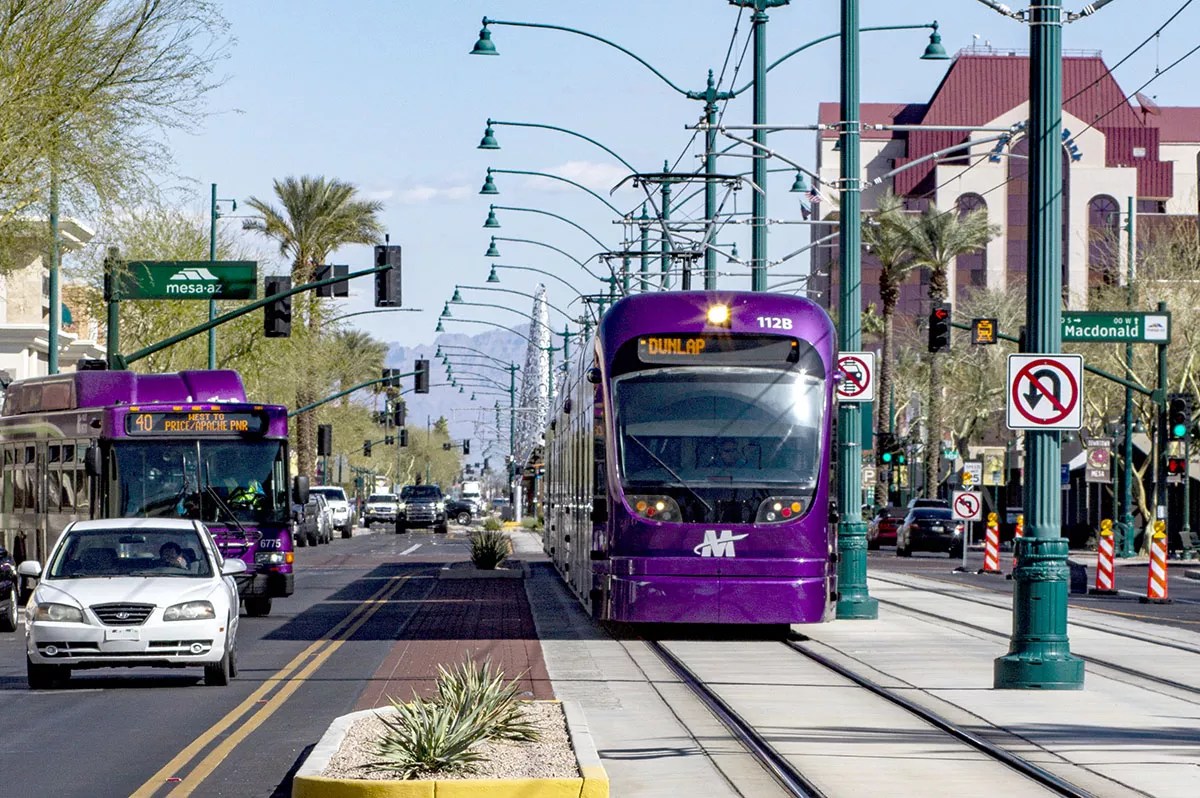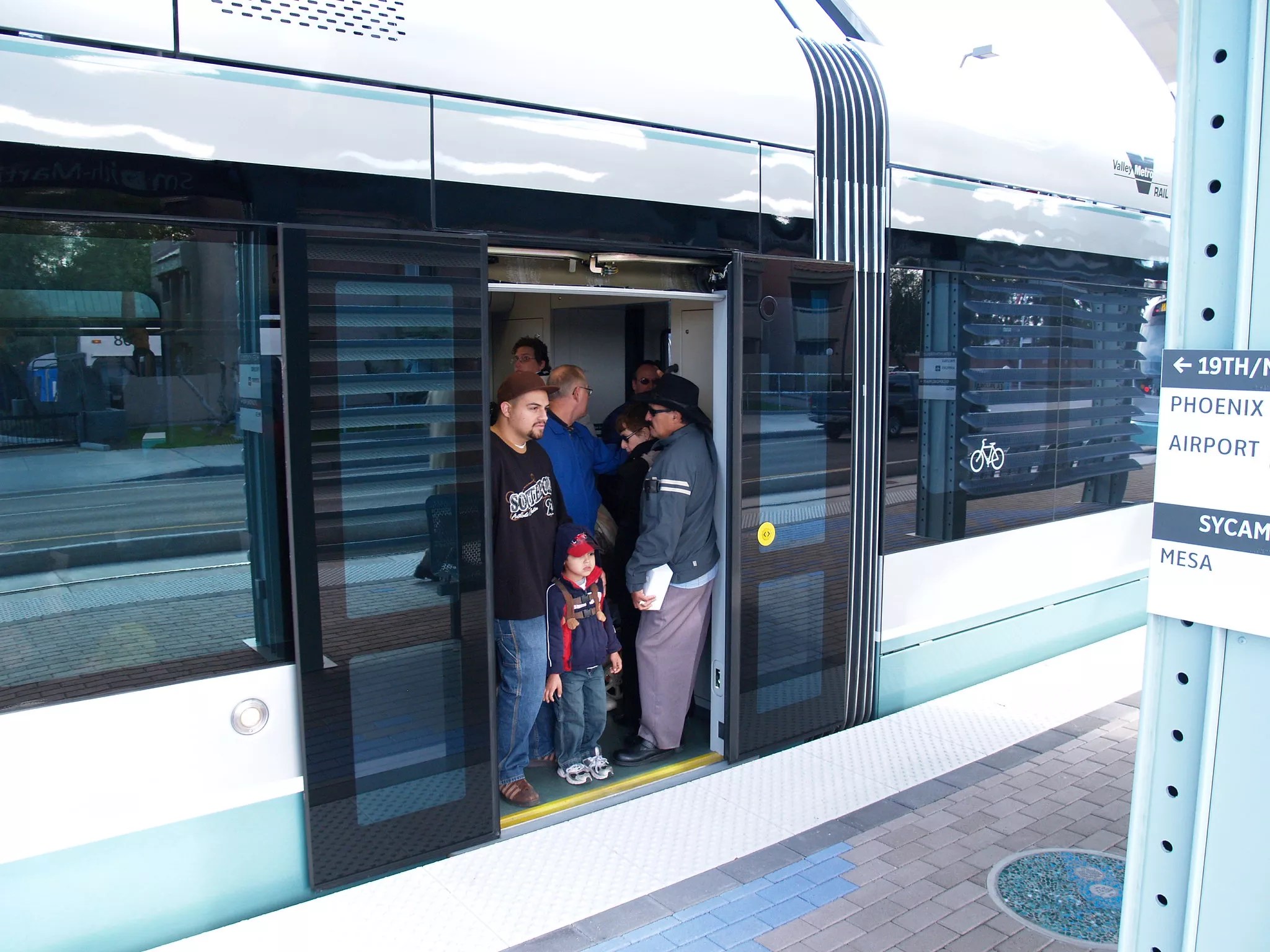
Phoenix New Times Staff

Audio By Carbonatix
Within a few minutes at the 19th Avenue and Camelback Road light rail station, it became clear that passengers were having a rocky experience.
“Make sure you have a ticket,” a fellow passenger-to-be said as the train rolled up to the platform and a group of riders fumbled with a malfunctioning fare machine.
Just a few years ago, security guards spent much of their time glancing around the station and the inside of the trains purportedly looking for fare dodgers, but it was uncommon to see them physically check passengers’ tickets.
Times have changed.
Now it’s not unusual to arrive at a light rail station and see multiple security guards prowling both the platform and the train itself. Guards, employed by Allied Universal and contracted by Valley Metro, are tasked with verifying passengers’ tickets. Riders who fail to provide one could be slapped with a hefty fine, according to Valley Metro’s website.
One guard told Phoenix New Times that local police were “locking people up” for trying to hitch a ride without paying their way. He added that he had seen 60 people arrested in one night.
According to Valley Metro, the guard’s recollection was a bit of an exaggeration.
“There are no arrests for fare evasion, exclusive of any other criminal violations,” Susan Tierney, Valley Metro’s communications manager, said in an email.
Allied Universal guards – whom Valley Metro refers to as field security officers – are empowered to write civil citations with penalties ranging from $50 to $500. Sometimes, these citations bar the recipient from returning to the light rail that service day – a constraint that, if violated, can lead to arrest by local police officers, Tierney said.
From Sept. 4 through Nov. 17, Valley Metro’s Transit Enforcement Unit made issued 474 citations for trespassing and made 223 arrests with 173 of those arrests for outstanding warrants, according to Phoenix police. The unit comprises Valley Metro’s field security officers and police officers from Phoenix, Mesa and Tempe.
The Phoenix Police Department did not respond to a request for comment regarding the operating cost of its light rail detail.

Passengers inside a westbound light rail train at Smith-Martin/Apache Boulevard station in Tempe.
Steven Vance | Flickr
Valley Metro’s ‘war on homelessness’
During a Dec. 4 Phoenix Public Safety and Justice Subcommittee meeting, Valley Metro CEO Jessica Mefford-Miller said that up to 12.3% of its 10.12 million annual light rail passengers don’t pay for their trips.
She also noted that in October and November, security officers issued 697 citations – 667 of them within the city of Phoenix – and “removed” 8,090 people from light rail platforms.
Despite the number of individuals riding for free, Tierney insists that the Valley Metro system “remains accessible to our range of customers.” Fares that cost $2 for a one-way ticket and $4 for a day pass account for more than half of Valley Metro trips, Tierney said.
Katherine Kouvelas-Edick is the founder of the Aris Foundation, a Tempe nonprofit that provides food, clothing and other essentials to unsheltered individuals. She told New Times that Phoenix’s unsheltered population is being priced out of using the metro system and that it could have a trickle-down effect.
“(The light rail) affords the opportunity to get to various feeding programs around the Valley,” Kouvelas-Edick said. “Many of the feeds are right off the light rail to ensure people can access them easily. If you remove the ability to get there, you remove the ability for individuals to be able to eat. And when people cannot eat, they will sometimes resort to stealing to fulfill that need.”
The costs and benefits of Valley Metro’s ramped-up fare enforcement efforts ultimately would determine whether stealing a free ride was worthwhile, Kouvelas-Edick added.
Statistics shared at the city council’s subcommittee meeting in December revealed a six-fold increase in total passenger citations during November 2023. It’s unclear whether those citations are usually paid.
Kouvelas-Edick said most unsheltered people who receive Valley Metro citations won’t be able to pay. “It may deter them from using the transit system again. It may not,” she said of the enforcement program’s effectiveness. “Arresting individuals for a $2 to $4 issue seems ludicrous to me, but it’s evident to see that the war on homelessness is increasing.”
Although Valley Metro does offer a reduced fare program, it is available to a limited scope of people. Currently, only youth ages 6-18, seniors age 65 and older, persons with disabilities and Medicare cardholders are eligible to participate in the program. For now, participation is not needs-based.
Lack of transportation access has Kouvelas-Edick worried about the well-being of the city’s homeless residents.
“That population relies on public transportation not only to get from point A to point B but also to provide warmth in the winter and air conditioning in the summer,” Kouvelas-Edick said. “It is a means of comfort and survival for many.”